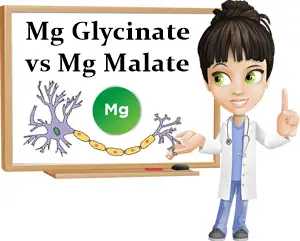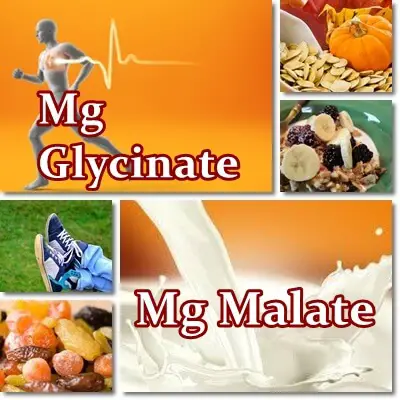Magnesium glycinate and malate are dietary supplements used for correcting a magnesium deficiency. Both forms are assumed to have an overall good absorption rate and elicit few side effects when consumed in adequate amounts. Some of the benefits of taking magnesium glycinate and malate include improved sleep and muscle function, fewer or less severe muscle cramps and spasms, benefits for blood sugar control in type 2 diabetes, benefits for mental health in the form of reduced stress and anxiety, reduced fatigue, strong bones and teeth, constipation relief and better blood pressure numbers.
Magnesium glycinate is a formula in which the mineral magnesium is bound to the non-essential amino acid glycine. The amino acid is naturally found in foods such as pork rind/skin, meat in general (pork, beef, turkey, chicken, venison), fish, crustaceans (crab, lobster, spiny lobster), pumpkin seeds, sesame seeds, peanuts, almonds, soy and the flours made from them. Magnesium malate is a formula in which the mineral is bound to malic acid. Malic acid is naturally found in rhubarb, apples and many other fruits, including berries, quinces, peaches, plums, mirrabelle plums and cherry plums.

In both formulas, the mineral magnesium is bound to organic compounds (the amino acid glycine and the fruit acid known as malic acid). And because it is bound to organic compounds, it is better absorbed compared to inorganic forms. However, of the two, the magnesium glycinate formula appears to be slightly better absorbed than the magnesium malate formula. The only difference between them being the type of compound the mineral is bound to: amino acid vs organic acid.
Bioavailability and absorption rates
The exact absorption rate of magnesium glycinate is unspecified at this point, but is known to be higher than that of magnesium citrate, for example, whose absorption rate is roughly up to 30%. So magnesium glycinate can be presumed to have an average bioavailability equal to or higher than 30%, based on available data. It’s also better than magnesium oxide (4-10% absorption rate), sulfate and carbonate (10-20% absorption rate).
Magnesium malate absorption rate is currently unspecified, but presumed to be lower than that of glycinate and possibly also citrate (whose absorption rate is roughly up to 30%). The difference in bioavailability between the glycinate and malate forms may be due to the fact that the mineral is bound to an amino acid in the glycinate form and to an organic acid in the malate form. The amino acid-bound form appears to favor a higher absorption of the mineral and help the magnesium better get into cells where it’s used intensively.

1) Mg glycinate form
Uses. This particular formula is used as a dietary supplement for correcting low blood magnesium levels and the side effects associated with a deficiency of the mineral such as poor muscle function with frequent, debilitating and possibly also painful cramps. Secondary uses for magnesium glycinate may include constipation relief, correcting an electrolyte imbalance, reducing anxiety and stress, calming nerves, reducing irritability, lowering a high hear rate, treating insomnia, improving sleep quality, reducing water retention in the stomach or legs or preventing painful leg, calf or foot cramps.
Dosage. Magnesium glycinate supplements are available in capsule, tablet or powder form, most commonly in doses of up to 400 mg. One 400 mg dose of magnesium glycinate is only about 14% magnesium and provides roughly 28.56 mg of the mineral. One or two 400 mg doses of magnesium glycinate a day may be recommended, depending on the case (severity of the deficiency, whether the formula is used to treat other conditions such as anxiety, migraines or chronic fatigue). You can easily get Mg glycinate at large discount retail stores such as Walmart or, if it’s more convenient, buy it online from Amazon.
Benefits. One of the main benefits of magnesium glycinate is preventing or reducing the frequency and severity of painful muscle cramps and muscle spasms such as nighttime leg cramps or calf or foot cramps after exercising. This formula is also good for restless leg syndrome and possibly also migraines and headaches. Magnesium glycinate is also a cure for insomnia and helps you get better quality, restful sleep as well as reduces chronic fatigue symptoms. It calms nerves and irritability, reduces stress and anxiety for improved mental wellbeing. Taken together with potassium, it helps lower high blood pressure and corrects electrolyte imbalances (which could also help with water retention and bloating). There are also minor benefits for constipation relief and blood sugar management.
Taking magnesium glycinate during pregnancy can potentially help with high blood pressure and water retention as well as prevent premature labor (by restoring electrolytic balance and optimizing muscle function, the mineral plays an important part in preventing premature contractions). However, remember to always consult with your doctor first.
Side effects. Magnesium glycinate is a generally safe formula that lends itself to long-term everyday use. There are few side effects and most are associated with an excessive intake. Side effects are generally mild and include loose stools, diarrhea and abdominal cramps. In rare cases, allergic reactions are possible and require immediate medical attention. Hives, swelling of the tongue, throat or face, difficulty breathing, wheezing, lightheadedness are some of the first symptoms of an allergic reaction.
2) Mg malate form
Uses. Magnesium malate is used as a dietary supplement for correcting low blood magnesium levels and the side effects associated with the deficiency. Other important uses for the formula include treating constipation, improving muscle function and sleep quality, uses for mental wellbeing (especially stress and anxiety), regulating cardioavascular function by correcting electrolyte imbalances for better blood pressure numbers and treating arrhythmias.
Dosage. Magnesium malate supplements are available in capsule, tablet or powder form, both online and in large store chains such as Walmart. For the purpose of correcting a deficiency and associated benefits, doses of 300 mg, 400 mg, 1250 mg and 1300 mg of magnesium malate are available. However, it’s always best to talk to your doctor first, especially if you have a chronic condition that could potentially be impacted by higher doses the mineral supplement.
Benefits. If you were wondering what is magnesium malate good for, know it has the same benefits as the glycinate formula, even though it’s technically not quite as bioavailable. Taking magnesium malate supplements is good for restless leg syndrome, painful muscle cramps and spasms, insomnia and fatigue. It may help with headaches and migraines (effect is dose-dependent), reduces stress and anxiety and helps calm nerves. Because it helps correct electrolyte imbalances, it contributes to better blood pressure numbers. And its positive effect on muscles and the nervous system further translates into benefits for the heart: fewer extrasystoles and palpitations.
The presence of malic acid may impart antibacterial properties to the supplement formula. Higher amounts lead to loose stools and encourage bowel movements, relieving constipation. There may also be minor benefits for blood sugar control in type 2 diabetes. Magnesium malate is also reported to hold some benefits specifically for women: it’s good for bone density, period cramps and during pregnancy for hypertension, water retention and fatigue.
Side effects. Magnesium malate is more likely to cause loose stools and diarrhea compared to the glycinate form. In part, this is owed to an excessive intake (it comes in higher doses), in part because of the malic acid formulation to which some consumers may be sensitive to. In rare cases, allergic reactions are possible. Watch out for signs such as hives, throat or tongue swelling, difficulty breathing, wheezing, hoarseness, lightheadedness and seek medical assistance immediately.
